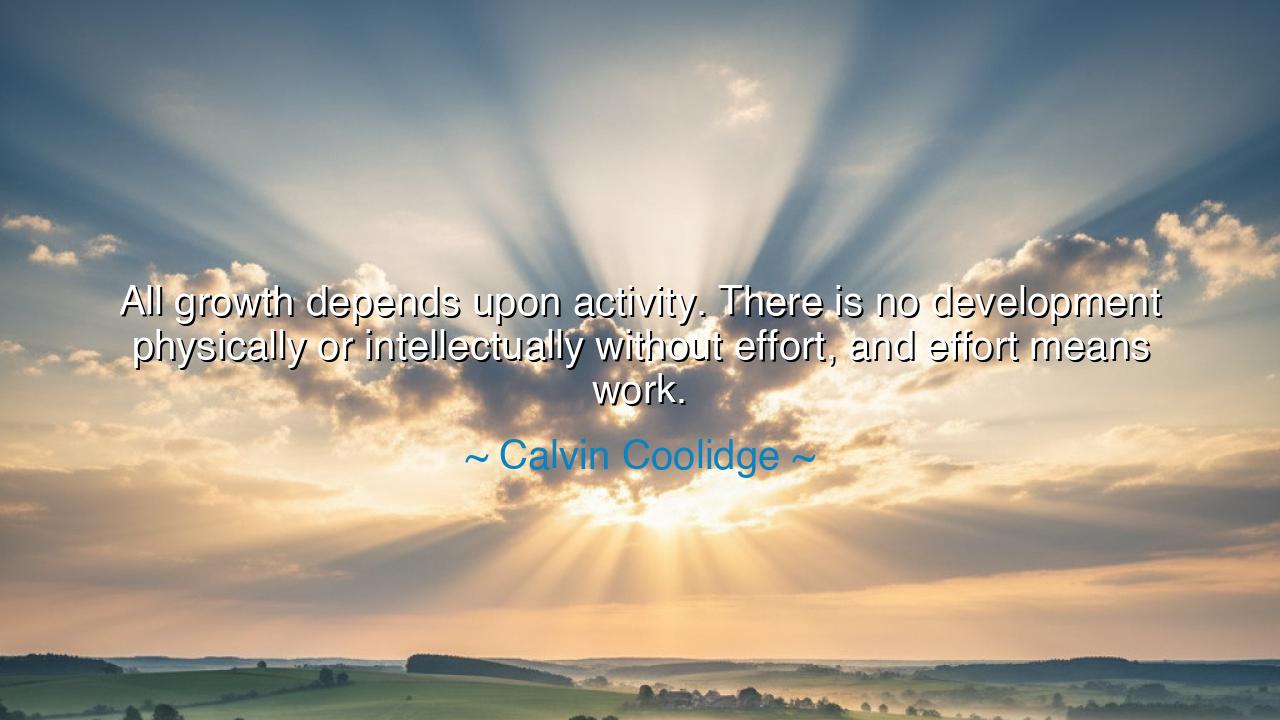
All growth depends upon activity. There is no development
All growth depends upon activity. There is no development physically or intellectually without effort, and effort means work.






In the great order of the universe, all things that live and breathe are bound by the eternal law of growth. From the smallest seed hidden beneath the earth to the mighty mind that contemplates the stars, advancement is never born of stillness. Calvin Coolidge, a leader of men and a student of life’s truths, speaks of this unchanging principle: all growth depends upon activity. Just as a river must flow lest it stagnate, so too must the human spirit and body be set in motion if they are to flourish.
He teaches that there is no development physically or intellectually without effort. The body, when left idle, withers and weakens, but through movement and trial, it grows strong and resilient. Likewise, the mind cannot sharpen itself in silence and ease; it must wrestle with questions, labor through study, and strive to understand. Just as iron is honed by the grindstone, so is the intellect sharpened by challenge and adversity. Without this sacred struggle, the gifts of strength and wisdom remain forever dormant.
But effort itself is more than a fleeting burst of energy; it is the daily discipline of labor, the steady offering of one’s will to the tasks at hand. Coolidge reminds us that effort means work, and work is the vessel through which dreams are given form. Those who seek greatness without toil chase shadows, for nothing of lasting value is born from ease. Even the sun must rise and set, even the earth must turn unceasingly — and so must we act, with purpose and constancy.
This wisdom is as ancient as the dawn of humankind, yet it must be spoken anew to every generation. In ages past, empires were built, discoveries were made, and art was created only through the ceaseless labor of those who dared to strive. Coolidge’s words are a reminder that growth is not a gift freely given, but a reward earned through activity and perseverance. Let this teaching be engraved upon the hearts of all: to stand still is to decay, but to move forward, even through struggle, is to fulfill the destiny of life itself.






LLeeeeeee
The idea that growth requires effort makes sense, but how do we reconcile that with the idea that some of the best moments of growth come when we're least expecting it—like during times of rest or reflection? Maybe growth isn't just about effort in the traditional sense, but about creating space for new insights and experiences. Can growth truly happen without a bit of pause, or do we need both effort and reflection for real development?
NLNguyen Ngoc Linh
Calvin Coolidge’s quote emphasizes that growth requires active effort, which is motivating, but is that always true for everyone? Some people may not have the same opportunities or resources to put in the effort needed for growth. How do we ensure that growth isn't just seen as something available to those who can afford to put in the effort, but something everyone can access in different ways?
LNLe Ngoc
Coolidge's statement is motivating, yet it also brings up an important point about the balance between work and the quality of effort. How do we measure meaningful effort? Just working harder isn't always the answer. What if we are putting in effort but in the wrong areas? How do we ensure that our energy is being spent wisely toward goals that truly contribute to our growth?
DLNguyen Dang Luong
This quote by Calvin Coolidge is a great reminder that progress takes effort. However, it also raises an important question: Does the kind of work we put in always guarantee growth? How can we ensure that the work we’re doing is the right kind—productive and fulfilling—rather than just busy work that keeps us stagnant or stuck in the same place?
CTLe Cam Tu
I agree with Coolidge’s point that growth is tied to effort and work, but it makes me wonder: How do we avoid burnout when the idea of constant effort is emphasized so much? Is it possible to grow without feeling like we have to keep pushing ourselves relentlessly? Can growth also be about pacing ourselves and finding joy in the process instead of just focusing on the end result?